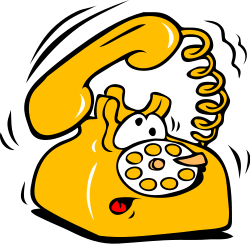It’s not always clear who is the real inventor of many well known inventions. I just read an interesting article in EDN magazine: Meucci acknowledged as telephone inventor, June 11, 2002. It tells that United States Congress acknowledged Italian immigrant Antonio Meucci as the true inventor of the telephone just ten years ago. Meucci began developing the design of a “telegrafo parlante” or talking telegraph in 1849 and he filed a caveat for his design in 1871. Unfortunately Meucci could not renew his caveat when it expired.
Usually the credit often goes to the person with the patent and thus the history recorded Alexander Graham Bell as the inventor of the telephone after Bell was awarded US Patent Number 174,465, Improvement on Telegraphy, on March 7, 1876. Elisha Gray (a professor at Oberlin College) also applied for a patent for telephone on the same day as Bell (February 14, 1876) but unfortunately arrived at the office later that day (just hour or two behind). At the time, the USPTO required the submission of a working patent model for the patent application to be accepted.
The Elisha Gray and Alexander Graham Bell controversy concerns the question of whether Bell or Gray invented the telephone independently and, if not, whether Bell stole the invention from Gray. This controversy is narrower than the question of who deserves credit for inventing the telephone, for which there are several claimants. Antonio Meucci being one of them.
After more than hundred of years of service land line telephone service starts to be slowly phasing out. The plain old telephone service (POTS) has been mostly digital for years, and the only analog part of the system is the final run to your house. Now telecom companies are thinking that Alexander Graham Bell’s quaint analog system is now outdated enough to be a corporate nuisance (it is expensive to maintain). Voice is increasingly going to cellular phones that are phasing out traditional fixed telephones.
AT&T recently informed the FCC that they consider traditional landline telephones to be “relics of a by-gone era.” In Finland Teliasonera has been for many years been dismantling telephone line wiring on rural areas.
AT&T’s assertion: “It makes no sense to require service providers to operate and maintain two distinct networks when technology and consumer preferences have made one of them increasingly obsolete.” AT&T looks forward to the day when sharing a phone number is a bizarre thing of the past. Cellular service requires personal handsets and generates more revenue to telecom companies.

3 Comments
Tomi Engdahl says:
Forget Edison: This is How History’s Greatest Inventions Really Happened
http://www.theatlantic.com/business/archive/2012/06/forget-edison-this-is-how-historys-greatest-inventions-really-happened/258525/
The myth of the solitary inventor — in 8 short stories
The world’s most famous inventors are household names. As we all know, Thomas Edison invented the light bulb, Alexander Graham Bell invented the phone, and Eli Whitney invented the cotton gin.
Except they didn’t. The ideas didn’t spring, Athena-like, fully formed from their brains. In fact, they didn’t spring fully formed from anybody’s brains. That is the myth of the lonely inventor and the eureka moment.
“Simultaneous invention and incremental improvement are the way innovation works, even for radical inventions,”
Tomi Engdahl says:
Rotary Phones and the Birth of a Network
http://hackaday.com/2017/07/26/rotary-phones-and-the-birth-of-a-network/
Tomi Engdahl says:
Telephone Circuits
http://techlib.com/electronics/telephone.html